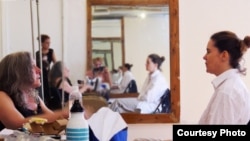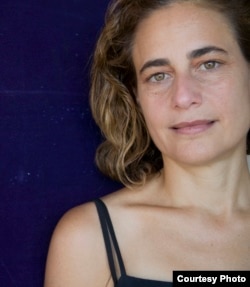Catherine Filloux is a French-American who lives and works in New York. She is a playwright whose works are famous for addressing issues of human rights issues and social justice.
Her new play, “Selma ’65,” tells the stories of Viola Liuzzo, a white civil rights activist, and Tommy Rowe, an FBI informant under cover with the Ku Klux Klan who was responsible for shooting Viola Liuzzo. The play is in honor of the American civil rights movement of the 1960s.
Before this play, Filloux spent years working with victims of the Khmer Rouge genocide in Cambodia. She wrote several plays about Cambodia. “Eyes of the Heart” tells the story of Cambodian women grappling with post-traumatic stress disorder following the Khmer Rouge massacres, while “Silence of God” looks at the regime’s atrocities through the eyes of journalists.
Filloux recently spoke to VOA Khmer by phone from New York.
How did you become interested in the US Civil Rights in the 1960s?
I was asked to write the play by an actress. The actress’s name is Marietta Hedges. She is an actress in Washington, DC, and she wanted me to write her a one-woman play. So she found out about the story that we were writing about and told me about it. And I did a lot of research about Selma ’65, and I decided to write the story so that Marietta, the actress, could play Viola Liuzzo, white civil rights activist, and also Tommy Rowe, the FBI informant that was infiltrating the Ku Klux Klan. So she was playing both roles.
Who is your audience for this particular issue?
The play is being done at La MaMa, and the audience will be a general audience, so it will include young people and people from different ages and ethnicities. And also we are doing panels after many of the performances, so we will be hoping to attract a large part of community.
Why do you think this part of American history is important?
Well, one of the issues is that the Supreme Court, about a year ago or a little bit more than a year ago, ruled against the Voting Rights Act. So in other words, they took away much of the power of the Voting Rights Act. In 1965 the Selma voting march happened, and as a result, the Voting Rights Act came into being in 1965. So just recently, the Supreme Court has taken away that power and has made it more difficult for minorities to vote. So again, all the bloody struggle which had occurred in the ‘60s to give everybody the equal right to vote, and we find ourselves in 2014 and 2015 in the situation where the right to vote has been put in jeopardy.
What are the messages that you would like to get across to the audience and to provoke general discussion on at the local level and also at the upper level?
2015, next year, will be the 50th anniversary of the Selma voting march, and I think that all of the issues surrounding voting rights are still extremely important. We need to put the light on them and to kind of honor their history. And also the play deals with a lot of issues surrounding women’s rights. I often, as you know, write about human rights, including human rights in Cambodia, and I’m interested in looking at the challenges that women have in the United States.
In the 1960s, there were a lot of protests against the Vietnam War. But nowadays you don’t see a lot of protests. What is going on with the youth today? Do they care about their rights at all?
Well, you know that I was mentioning the actress Marietta Hedges, who is living in DC. She has been an activist and spent so much time protesting against many different things, you know, in the present. And I have other friends in DC who do the same thing. So I think protesters still are strong. I think. I wouldn’t say that demonstrating and protesting is over. I think if you look at what happened at the beginning, right before the war in Iraq started, there were demonstrations that were enormous. So I think it is important to look at what has happened and maybe the ways that those things are kind of silent.








